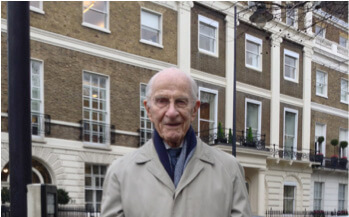
By Yang Mengyu
LONDON — I met Dr. Bill Frankland 100 meters from the British Broadcasting Corporation. I saw him haltingly cross the street, wearing a trench coat and leather shoes. He looked very British, and I could tell just with a glance that he had an amazing story.
Our group of Chinese journalism students was trying to find a story for the BBC training program “Finding Stories” we were attending, but I never expected such a good one.
“I’m 102 years old. I will become 103 in March,” Dr. Frankland said proudly.
Dr. Frankland is a doctor and former soldier. During the Second World War, he joined the Royal Army Medical Corps and was sent to Singapore, where he was promoted to captain.
“As a doctor, I should save people. But I saw more people die in front of me. I couldn’t talk for almost three years and I can’t forget that time ever,” Dr. Frankland said.
In February of 1942, the Japanese swept into Singapore. Frankland was captured by the Japanese and kept in a prisoner of war camp for three-and-a-half years.
I was astonished. It reminded me of the 1937 Nanjing Massacre, in which hundreds of thousands of Chinese were raped and murdered by the Japanese. I never thought western people had suffered similar atrocities committed by the Japanese.
More than 70 years have passed, and most of the soldiers have died, their painful memories untouchable. Soon, living oral history from the Second World War will no longer exist.
Dr. Frankland, along with other prisoners of war and their Japanese captors, were filmed by the BBC in the documentary “Building Burma’s Death Railway: Moving half the mountain”. Both sides tell the story of how the Japanese used British prisoners of war to build the railway between Thailand and Burma in 1943.
Dr. Frankland said he was also transferred to a work camp, known as “Hell Island,” now known as Sentosa, Singapore’s island resort. “Japanese would line us up and punch us in the face. Once I was bashed unconscious and lost a tooth,” he recalled in the film.
“It’s hard to speak out. One of my friends even can’t hear the word ’Japanese’,” Dr. Frankland said. “It’s hard to forgive.”
But he chose to forgive. After all the hardship and violence, watching his friends die, he said he still chooses to confront life with forgiveness.
After the war, Dr. Frankland went back to work as an allergist at St. Mary ‘s Hospital in Paddington.
“If I hate them it would do me harm but it won’t damage them, and also, I’m a Christian and I was taught to love, rather than hate,” he said.